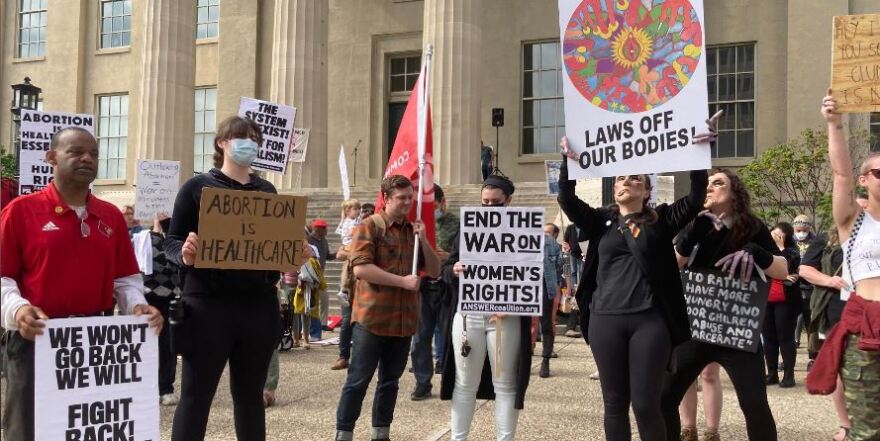The U.S. Supreme Court has ruled in favor of the state of Mississippi in Dobbs v. Jackson Women’s Health Organization. The decision effectively overturns Roe v. Wade, the 1973 landmark case that provided federal protection for a person’s right to choose an abortion.
Now, abortion is illegal in Kentucky in almost all circumstances.
State lawmakers have been preparing for this. In 2019, the Kentucky legislature passed a so-called “trigger law,” which was set to go into effect automatically should the Supreme Court overturn Roe and give states the right to decide on abortion access. It’s one of 13 states in the U.S. with such laws in place, although most require a waiting period or further action for it to take effect.
Kentucky’s law makes it a Class D felony for anyone to provide procedural or medication abortions in the state. The only exceptions are if an abortion is medically necessary to save the life of the pregnant patient or to prevent the permanent impairment of a life-sustaining organ.
Kentucky challenges to abortion rights
The trigger law is not the only challenge to abortion access in Kentucky. A constitutional amendment on the ballot in November could add a new section with the language, “To protect human life, nothing in this Constitution shall be construed to secure or protect a right to abortion or require the funding of abortion.”
There are also several state laws related to abortion currently blocked in court, which could come back into play after Friday’s ruling. In 2019, the legislature passed a law banning abortion based on race, gender or ability. They passed a separate measure the same session blocking abortion at around six weeks.
These would likely not go into effect without action, such as the attorney general petitioning the court to dismiss the cases.
In March, the Republican-led legislature passed House Bill 3, which makes it harder for minors to get abortions, restricts abortion medication and bans abortion at 15 weeks — using almost identical language to the Mississippi bill at issue in Dobbs.
The Kentucky law is currently partially blocked, after Planned Parenthood and the ACLU challenged it in federal court. Providers temporarily stopped abortions for more than a week because they said they couldn’t comply with new regulations not yet established by the Cabinet for Health and Family Services.
The ACLU — representing Louisville’s EMW Women’s Surgical Center — also challenged the constitutionality of the 15-week ban. The judge blocked that part of the law pending the Supreme Court decision.
Planned Parenthood and EMW were the only abortion providers in the state.
Across the river
The Guttmacher Institute, a nonprofit policy and resource organization that advocates for abortion rights, reported that if Roe were overturned, more than half of U.S. states were certain or likely to severely restrict or ban abortion.
Indiana is among them. Although it does not have a specific trigger law in place, all but 10 members of the General Assembly endorsed a letter to Republican Gov. Eric Holcomb in March, asking for permission to call a special legislative session this year if the Supreme Court overturns Roe.
“As a state that recognizes that life is a precious gift that should never be neglected, it is our desire that you, as the Governor of Indiana, ensure that those values are upheld without delay,” it reads, in part. “We have a responsibility that our state laws are aligned with the Supreme Court’s decision if Roe v. Wade is wholly, or partially overturned.”
Dobbs v. Jackson Women’s Health Organization
The case that reversed 50 years of precedent for abortion access in the U.S. comes after a 2018 Mississippi law that made its way to the Supreme Court.
In 2018, Mississippi passed a law banning abortion at 15 weeks, which goes against the federal protection of Roe to have access to previability abortions. Viability is recognized as 24 weeks gestational age.
The Center for Reproductive Rights filed suit on behalf of Jackson Women’s Health Organization, the only provider in the state. The court ruled in favor of the Center, and that decision was upheld on appeal.
The state petitioned the Supreme Court in mid-2020, and oral arguments were heard this past December.
The Guttmacher Institute reports that in 2020, there were 4,080 abortions in Kentucky, a 28% increase since 2017.

